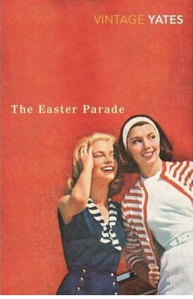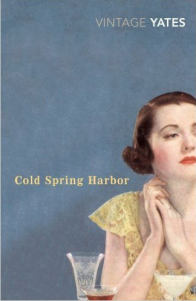

I had almost forgotten how fascinating it is to read several books of the same author, one after the other. You see patterns emerge, recurring motifs, similar themes. Maybe not every author’s work is as homogenous as Yates’ is. In his case, the books are variations on the same themes. Some readers might find it repetitive to read so many of his novels, but I liked to see the patterns and differences emerge. Comparing The Easter Parade with Cold Spring Harbor was particularly rewarding. Most of Yates’ main themes are already present in Revolutionary Road but The Easter Parade and Cold Spring Harbor take them one step further.
The similarities of The Easter Parade and Cold Spring Harbor are striking. In both books we have excentric, almost laughable, mothers who are prone to drinking. We have struggling daughters and/or sons, who desperately try to live a better life but fail hopelessly. We watch those daughters and sons have kids and already know they will pass on the “loser gene”. Divorce is as much a recurring theme as alcoholism, lack of ambition, self-deception, and a failure to stand up for oneself.
The Easter Parade tells the story of a mother, Pookie, and her two daughters, Sarah and Emily. From the frist sentence on we know the story will not be a happy one.
Neither of the Grimes sisters would have a happy life, and looking back it always seemed the trouble began with their parents’ divorce.
If ever a sentence summed up the books of an author, then this is it. Not only does it tell us that his characters will not be happy, but it places them firmly in a family tradition, which predestines them for unhappiness. This is an extremely pessimistic view of families. While I agree, it’s very difficult to free yourself from the influence of a dysfunctional family, I’m not as pessimistic as Richard Yates. I do believe it’s possible.
The two daughters in The Easter Parade live very different lives. While Sarah gets married early and has kids, Emily is a free spirit, who strives for a career and has many lovers. She does get married but the marriage doesn’t last. We can judge how pessimistic Yates was, when we follow Emily’s life. The only reasons, for me, why she couldn’t be happy was that her family prevented her. The strings that attached her were too tight, even after she left and went to live far away from them.
Cold Spring Harbor tells the story of different people. Evan Shepard comes from a broken home, although his parents aren’t divorced. His father could never live the life he wanted to live and his mother is a severely depressed alcoholic. Evan marries too early, gets a divorce, and then meets his second wife, Rachel and her family. Rachel’s mother resembles Pookie. She too has two kids, a daughter and a son, she is divorced, has illusions of grandeur and drinks too much. About halfway into the novel, we know that Rachel will follow in her footsteps and possibly pass her unhappiness on to her child. We do have hope for the son though.
Failed marriages and divorce are recurring themes but, unfortunately, Yates’ characters experience other forms of misery. They are either not ambitious and therefore never achieve any type of professional fulfillment, or they are ambitious but not good enough at what they are doing and will never know success.
Both novels are sad and tragic but, strangely enough, they didn’t depress me. Yates’s outlook is pessimistic but when you look at his characters closely, you see that the misfortune is the result of their own doing. You don’t need to let your parents unhappy lives/marriages drag you down. Just because your parents drink, that doesn’t mean you have to start drinking as well. Maybe it’s odd, but in a way I found the books almost comforting because, maybe unbeknownst to Richard Yates himself, they seemed to be telling— this only happened to these people because they didn’t free themselves.
And then, like in Revolutionary Road – there’s the writing which is simply amazing. He’s got a knack for describing people like not many other authors. Actually, this aspect of his writing, reminded me a lot of Jane Austen. I already felt that when reading Revolutionary Road but after these two books, even more. Like Jane Austen, he can see right through people and phrase this in a witty way. The biggest difference is the fate he’s got in store for them. Not one of them is allowed a Happy Ending à la Austen. That said, his observations and descriptions are so masterful that they always cheer me up.
I’m not sure which of the three novels I’ve read so far I liked best. Possibly The Easter Parade. Cold Spring Harbor is like another version of that book; a slightly less perfect one.
Here’s my review of Revolutionary Road.
